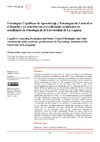Please use this identifier to cite or link to this item:
https://accedacris.ulpgc.es/jspui/handle/10553/107140
| DC Field | Value | Language |
|---|---|---|
| dc.contributor.author | Felipe Afonso, María Isaura | en_US |
| dc.contributor.author | García, Luis A. | en_US |
| dc.contributor.author | Castro Sánchez, José Juan | en_US |
| dc.date.accessioned | 2021-05-06T18:41:06Z | - |
| dc.date.available | 2021-05-06T18:41:06Z | - |
| dc.date.issued | 2020 | en_US |
| dc.identifier.issn | 2172-3427 | en_US |
| dc.identifier.uri | https://accedacris.ulpgc.es/handle/10553/107140 | - |
| dc.description.abstract | Basándonos en estudios anteriores sobre las variables que influyen en el rendimiento académico universitario, presentamos como objeto de esta investigación, el estudio de la relación entre las estrategias cognitivas de aprendizaje y del control del estudio con el rendimiento académico de la población universitaria. Se ha realizado un estudio experimental descriptivo con 764 estudiantes pertenecientes a grupos que cursaban 3º de Psicología desde el año 2013 hasta el año 2019. A través de las pruebas Estrategias Cognitivas de Aprendizaje (ECA) y Estrategias de Control en el Estudio (ECE), recogiendo a su vez, el rendimiento académico. Se llevó a cabo unaprueba de diferencias de medias t–Student para grupos independientes según sus notas académicas, formándose así, un grupo denominado BajoR (33% de alumnos/as con puntuaciones inferiores a 6 sobre 10) frente a AltoR (33% de alumnos/as con puntuaciones superiores a 7,5 sobre 10). Los resultados muestran que los estudiantes con mejor rendimiento, utilizan más estrategias de estructuración y elaboración del contenido y nemotecnias. Sin embargo, los estudiantes con peores resultados, utilizan como estrategias el aprendizaje receptivo (aprender el contenido tal y como aparece), el aprendizaje mecánico-superficial (sin entender) y el aprendizaje repetitivo. A su vez, los estudiantes con mejor rendimiento utilizan más estrategias de control del estudio que los estudiantes con peor rendimiento, encontrando diferencias significativas en las estrategias como revisión, planificación, búsqueda de alternativas, control del tiempo, reaprendizaje, detallar las tareas, controlar las variables externas y contar con apoyos personales para el estudio. Estos datos nos muestran la necesidad de valorar la mejora del rendimiento académico universitario a través de la aplicación estrategias de aprendizaje óptimas y de unas adecuadas técnicas de control del estudio. | en_US |
| dc.description.abstract | Based on previous studies about factors that influence at university academic performance, we present as an object of this research, a study of the relationship between cognitive learning strategies and study control with the academic performance of the university population. A descriptive experimental study has been carried out with 764 students belonging to groups of 3rd year of Psychology from 2013 to 2019, through the Cognitive Learning Strategies (ECA) and Control Strategies in the Study (ECE) tests, including academic performance. A mean difference Student's t-test was carried out for independent groups according to their academic grades, in consequence creating a group called LowR (33% of students with scores below 6 out of 10) versus HighR (33% of students with scores higher than 7.5 out of 10). The results show that the students with better performance use more strategies of structuring and elaboration of the content and mnemonics. However, the worst-performing students use receptive learning (learning the content as it appears), mechanical-superficial learning (without understanding) and repetitive learning as strategies. At the same time, the best performing students use more study control strategies than the worst-performing students, finding significant differences in strategies such as revision, planning, search for alternatives, time control, relearning, detailing tasks, controlling external variables and resort to personal support for the study. These results show us the need to assess the improvement of university academic performance through the application of optimal learning strategies and adequate study control techniques. | en_US |
| dc.language | spa | en_US |
| dc.relation.ispartof | Revista De Investigacion En Educacion | en_US |
| dc.source | Revista de investigación en educación [ISSN 2172-3427], v. 18 (3), p. 304-315 | en_US |
| dc.subject | 580203 Desarrollo de asignaturas | en_US |
| dc.subject | 710203 Motivación | en_US |
| dc.subject | 580206 Análisis, realización de modelos y planificación estadística | en_US |
| dc.subject.other | Estrategias | en_US |
| dc.subject.other | Control | en_US |
| dc.subject.other | Aprendizaje | en_US |
| dc.subject.other | Rendimiento | en_US |
| dc.subject.other | Strategies | en_US |
| dc.subject.other | Control | en_US |
| dc.subject.other | Learning | en_US |
| dc.subject.other | Performance | en_US |
| dc.title | Estrategias Cognitivas de Aprendizaje y Estrategias de Control en el Estudio y su relación con el rendimiento académico en estudiantes de Psicología de la Universidad de La Laguna | en_US |
| dc.type | info:eu-repo/semantics/article | en_US |
| dc.type | Article | en_US |
| dc.identifier.doi | 10.35869/reined.v18i3.3269 | en_US |
| dc.identifier.issue | 3 | - |
| dc.investigacion | Artes y Humanidades | en_US |
| dc.type2 | Artículo | en_US |
| dc.utils.revision | Sí | en_US |
| dc.identifier.ulpgc | Sí | en_US |
| dc.contributor.buulpgc | BU-EGB | en_US |
| dc.description.esci | ESCI | |
| dc.description.dialnetimpact | 0,0 | |
| dc.description.dialnetq | Q2 | |
| dc.description.dialnetd | D3 | |
| item.grantfulltext | open | - |
| item.fulltext | Con texto completo | - |
| crisitem.author.dept | GIR Sociedad Digital | - |
| crisitem.author.dept | Departamento de Psicología, Sociología y Trabajo Social | - |
| crisitem.author.orcid | 0000-0002-9305-263X | - |
| crisitem.author.parentorg | Departamento de Psicología, Sociología y Trabajo Social | - |
| crisitem.author.fullName | Castro Sánchez, José Juan | - |
| Appears in Collections: | Artículos | |
WEB OF SCIENCETM
Citations
3
checked on Feb 15, 2026
Page view(s) 5
952
checked on Jan 15, 2026
Download(s)
623
checked on Jan 15, 2026
Google ScholarTM
Check
Altmetric
Share
Export metadata
Items in accedaCRIS are protected by copyright, with all rights reserved, unless otherwise indicated.
